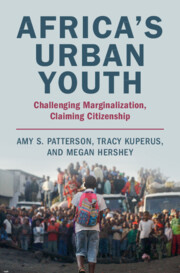Book contents
- Africa’s Urban Youth
- Africa’s Urban Youth
- Copyright page
- Dedication
- Contents
- Figures
- Tables
- Acknowledgments
- Abbreviations
- Introduction
- 1 Theorizing Urban Youth and Everyday Citizenship
- 2 Manifesting Citizenship through Local and Distinct Actions
- 3 Engaging the State
- 4 Confronting Economic Marginalization
- 5 Contesting Citizenship through Religious Identity
- 6 Affirming and Challenging Patriarchy
- 7 Channeling Frustration through Exit, Exclusion, and Engagement
- Conclusion
- Book part
- References
- Index
3 - Engaging the State
Published online by Cambridge University Press: 10 August 2023
- Africa’s Urban Youth
- Africa’s Urban Youth
- Copyright page
- Dedication
- Contents
- Figures
- Tables
- Acknowledgments
- Abbreviations
- Introduction
- 1 Theorizing Urban Youth and Everyday Citizenship
- 2 Manifesting Citizenship through Local and Distinct Actions
- 3 Engaging the State
- 4 Confronting Economic Marginalization
- 5 Contesting Citizenship through Religious Identity
- 6 Affirming and Challenging Patriarchy
- 7 Channeling Frustration through Exit, Exclusion, and Engagement
- Conclusion
- Book part
- References
- Index
Summary
The chapter examines everyday citizenship among youth respondents from the angle of their relationship to the state or as citizenship-from-above. Youth respondents initially defined citizenship in terms of legal obligations to the state. Afrobarometer findings that indicate high levels of support for obeying the law and paying taxes echo those responses, though respondents provide nuance to the Afrobarometer data. Legalistic views of citizenship are closely connected to the building and maintenance of strong relations at the local level and, for some, notions of morality. Few youth defined citizenship primarily in terms of voting, though Afrobarometer findings indicate large percentages do participate in elections. Even fewer youth respondents described citizenship as engagement in activities such as joining with others to advocate or protesting to hold governments accountable, a finding that aligns with the survey data. For these few youth, it is their everyday relationships with friends and neighbors and communal experiences of marginalization that motivate actions. Protest examples from South Africa and Uganda show that citizenship-from-above and citizenship-from-below blur and that everyday citizenship manifests in creative and agentic ways.
- Type
- Chapter
- Information
- Africa's Urban YouthChallenging Marginalization, Claiming Citizenship, pp. 70 - 90Publisher: Cambridge University PressPrint publication year: 2023

